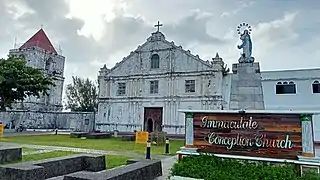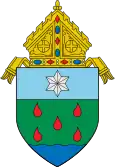Guiuan Church
The Immaculate Conception Parish Church (Spanish: Iglesia Parroquial de la Inmaculada Concepción), commonly known as Guiuan Church, is a Roman Catholic church in the municipality of Guiuan, Eastern Samar, Philippines, within the jurisdiction of the Diocese of Borongan.
| Guiuan Church | |
|---|---|
| Immaculate Conception Parish Church Iglesia Parroquial de la Inmaculada Concepción | |
 The Guiuan Church in 2022 | |
.svg.png.webp) Guiuan Church Republic of the Philippines | |
| 11°01′53″N 125°43′22″E | |
| Location | Guiuan, Eastern Samar |
| Country | Philippines |
| Denomination | Roman Catholic |
| History | |
| Status | Parish church |
| Founder(s) | Jesuits |
| Dedication | Immaculate Conception |
| Architecture | |
| Functional status | Active |
| Heritage designation | National Cultural Treasure |
| Architectural type | Church building |
| Style | Baroque |
| Completed | 1718 2019 (restoration from Typhoon Haiyan) |
| Demolished | 2013 (Typhoon Haiyan) |
| Administration | |
| Metropolis | Borongan |
| Archdiocese | Palo |
| Clergy | |
| Archbishop | John F. Du |
| Bishop(s) | Crispin Barrete Varquez |
The church is classified as a National Cultural Treasure by the National Museum of the Philippines. It was formerly nominated to the UNESCO World Heritage Sites of the Philippines under two categories, the Baroque Churches of the Philippines (Extension) and the Jesuit Churches of the Philippines.
The church, built in the 18th century, was significantly damaged when Typhoon Haiyan (local name: Yolanda) made landfall in Guiuan and struck other parts of Central Visayas on November 8, 2013. While the church's roof was destroyed and the façade damaged, the church's walls were largely left intact. Restoration of the damaged church was completed in 2019.
Church history

Guiuan (also spelled as Guiguan) was founded by the Jesuits in 1595. It was handed over to the Augustinians upon instructions from the Spanish colonial government due to the Jesuits Suppression in 1768. It was then transferred to the Franciscans in 1795 but due to lack of priests, Father Miguel Pérez, the first Franciscan priest of Guiuan was only assigned in 1804.[1] The original church of Guiuan was made of wood and destroyed by fire.[2]
The present stone church was dedicated to the Virgin Mary under the title of the Immaculate Conception and was built by the early Jesuits in 1718[3] and was renovated by adding a transept and baptistery during the term of Father Manuel Valverde and Pedro Monasterio in 1844.[4][5] A bell tower on top fort was built in 1854. Another convent was built by Father Arsenio Figueroa in 1872. The church was refurbished in 1935 and the sanctuary was renovated in 1987.[5] On November 8, 2013, the church along with other buildings and structures in Guiuan was severely damaged due to Typhoon Haiyan.[6] While the roof was destroyed and the façade was damaged, the church's stone walls remain unscathed, as do the floors and the crypts.
.jpg.webp) Guiuan Church before (left) and after (right) Typhoon Haiyan.
Guiuan Church before (left) and after (right) Typhoon Haiyan.

Historical and cultural declarations
The National Museum of the Philippines named Guiuan Church a National Cultural Treasure in 2001.[7] As a nominee for the UNESCO World Heritage Sites of the Philippines, it is grouped with Maragondon Church, Baclayon Church and Loboc Church for the Jesuit Churches of the Philippines[8] and with Boljoon Church, Loboc Church, Tumauini Church and Lazi Church for the Baroque Churches of the Philippines (Extension) nomination.[9] However, due to its total destruction, it was then removed to the roster of nominated sites.[10]
On March 18, 2021, as part of the 2021 Quincentennial Commemorations in the Philippines marking the 500th anniversary of the arrival of the Magellan–Elcano circumnavigation to the Philippines, the National Historical Commission of the Philippines unveiled a historical marker commemorating the church.[11]

Description
Guiuan Church is nestled inside a fort. It is well known for its extensive shell ornamentation in its interiors.[6] Studies revealed that at least eight types of seashells were used. Before its destruction, it still has two elaborately carved doors out of the original three doors. The main door on the entrance has exquisite carvings of the Twelve Apostles while a side door has carved representations of angels.[5] Former First Lady Imelda Marcos was interested in purchasing the church's door for ₱1,000,000 using government funds siphoned by her husband, Ferdinand Marcos.[12]
Present condition
Due to Typhoon Haiyan, all of its original retablo, roof (dated 1700s) and other church relics were damaged.[6][13] Only the stone walls and bell tower remained standing.[14] Restoration of the church is on-going under the supervision of the National Museum of the Philippines.[15] Funds for the reconstruction of the church amounting to $300,000 was given by the Embassy of the United States in the Philippines[16] and ₱112 million from the National Museum of the Philippines.[17] Restoration of the church was completed in 2019.[17][18]
See also
Notes
- Huerta 1865, p. 314
- Labro, Vicenter (June 11, 2011). "Guiuan's Treasure Chest of History, Natural Wonders". Inquirer.net. Archived from the original on January 3, 2015. Retrieved January 3, 2015.
- "Simbahan ng Guiuan" historical marker. National Historical Commission of the Philippines, 2021.
- Huerta 1865, p. 315
- "Guiuan". Panublion: Heritage Sites of the Visayan Islands in the Philippines. Archived from the original on February 11, 2006. Retrieved January 2, 2015.
- Villaon, Augusto F. (November 18, 2013). "Guiuan Church, a National Cultural Treasure in Samar, Heavily Damaged by 'Yolanda'". Inquirer.net. Archived from the original on January 3, 2015. Retrieved January 3, 2015.
- Alba, Reinerio A. (September 29, 2003). "The Restoration of 26 Philippine Churches". National Commission for Culture and the Arts. Archived from the original on May 12, 2014. Retrieved December 29, 2014.
- "Jesuit Churches of the Philippines". UNESCO World Heritage Centre. Archived from the original on October 19, 2014. Retrieved October 9, 2014.
- "Baroque Churches of the Philippines (Extension)". UNESCO World Heritage Centre. Archived from the original on October 15, 2014. Retrieved October 9, 2014.
- "3 Damaged Visayas Churches Removed from World Heritage Tentative List". GMA News Online. August 13, 2014. Retrieved January 3, 2015.
- Arceo-Dumlao, Tina (March 28, 2021). "Eastern Samar Church Marks Lent – and Its Place in PH Art, History". Inquirer.net. Retrieved April 15, 2021.
- Batham, Tere (December 2007). "Treasures of the Philippines". Cruising World Magazine. p. 58.
- Aljibe, Ted (November 12, 2013). "Guiuan, E. Samar a 'Terrifying' Wasteland in Wake of 'Yolanda'". Agence France-Presse. ABS-CBN News. Retrieved January 3, 2015.
- AFP Central Command. "Aerial View of the Church of Guiuan in Eastern Samar". CBCP News. Archived from the original on January 3, 2015. Retrieved January 3, 2015.
{{cite web}}: CS1 maint: unfit URL (link) - Labro, Vicente Alejandro S. (July 12, 2014). "NMP Rebuilds Typhoon-Ravaged Church of Guiuan". Manila News Online. Archived from the original on January 3, 2015. Retrieved January 3, 2015.
- Mabasa, Roy (October 31, 2014). "Guiuan Church Gets P13M from US Embassy". Manila Bulletin. Archived from the original on January 3, 2015. Retrieved January 3, 2015.
- Beronio, Alren (November 8, 2019). "Guiuan Church Rises Again 6 Years After Yolanda". ABS-CBN News. Retrieved June 26, 2021.
- Morrison, John; Livingstone, Annabel (September 30, 2020). "Restoring and Conserving the Parish Church at Guiuan, Eastern Samar". The University of Melbourne.
Bibliography
- Huerta, Felix de (1865). Estado geográfico, topográfico, estadístico, histórico-religioso [Geographical, topographical, statistical, historical and religious state] (in Spanish). Binondo: Imprenta de M. Sanchez y Ca.
Further reading
- Bautista, Angel (2003). Shell Ornamentation of La Purísima Concepción Church, Guiuan, Eastern Samar. Manila: National Commission for Culture and the Arts. p. 64. ISBN 9718140395.
- An Historical Essay on the Beginnings of the Evangelization of Guiuan
